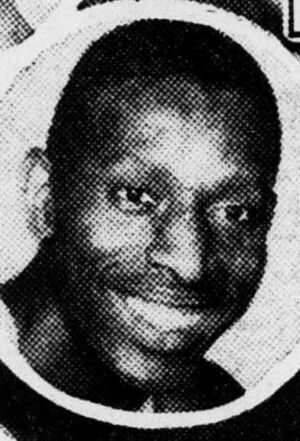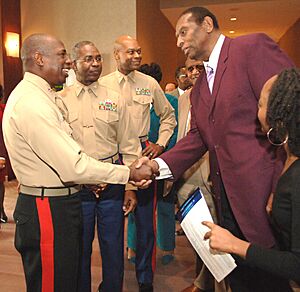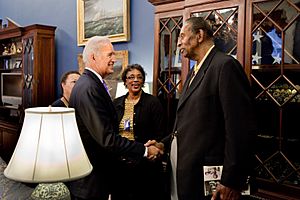Earl Lloyd facts for kids

Lloyd circa 1950
|
|
| Personal information | |
|---|---|
| Born | April 3, 1928 Alexandria, Virginia, U.S. |
| Died | February 26, 2015 (aged 86) Crossville, Tennessee, U.S. |
| High school | Parker-Gray (Alexandria, Virginia) |
| Listed height | 6 ft 6 in (1.98 m) |
| Listed weight | 200 lb (91 kg) |
| Career information | |
| College | West Virginia State (1946–1950) |
| NBA Draft | 1950 / Round: 9 / Pick: 100th overall |
| Selected by the Washington Capitols | |
| Pro career | 1950–1960 |
| Coaching career | 1971–1972 |
| Career history | |
| As player: | |
| 1950–1951 | Washington Capitols |
| 1952–1958 | Syracuse Nationals |
| 1958–1960 | Detroit Pistons |
| As coach: | |
| 1971–1972 | Detroit Pistons |
| Career highlights and awards | |
|
|
| Career statistics | |
| Points | 4,682 (8.4 ppg) |
| Rebounds | 3,609 (6.4 rpg) |
| Assists | 810 (1.4 apg) |
Earl Francis Lloyd (born April 3, 1928, died February 26, 2015) was a very important American basketball player and coach. He made history as the first African American player to ever play in a game in the National Basketball Association (NBA).
Earl Lloyd was an amazing player in college at West Virginia State University, where he helped his team have a perfect, undefeated season in 1948. Later, as a professional player, he helped the Syracuse Nationals win the NBA Championship in 1955. He also became a coach for the Detroit Pistons in 1971, making him the first African American head coach in the NBA who wasn't also playing on the team. Because of his incredible career, Earl Lloyd was honored by being added to the Naismith Basketball Hall of Fame in 2003.
Contents
Growing Up and Early Basketball
Earl Lloyd was born in Alexandria, Virginia, on April 3, 1928. His dad worked in the coal industry, and his mom took care of their home. Even from a young age, Earl was a talented basketball player. In high school, he was recognized as one of the best players in his area many times.
Earl went to Parker–Gray High School, graduating in 1946. He played basketball there for Coach Louis Randolph Johnson. He received a special scholarship to play basketball at West Virginia State University, where their team was called the Yellow Jackets. During his college days, people sometimes called him "Moon Fixer" because he was so tall and strong. He was especially known for being a great defensive player, meaning he was excellent at stopping the other team from scoring.
College Basketball Success
At West Virginia State, Earl Lloyd was a key player. He helped his team win the Central Intercollegiate Athletic Association (CIAA) Conference and Tournament Championships twice, in 1948 and 1949. He was chosen as an All-Conference player three times and an All-American player twice.
In his senior year, he scored about 14 points and grabbed 8 rebounds in each game. He led his team to a second-place finish in the CIAA. The 1947–48 season was truly special because West Virginia State had a perfect record, winning all 30 of their games! Earl graduated from the university in 1950 with a degree in physical education.
Playing with the Harlem Globetrotters
Before joining the NBA, Earl Lloyd played for the famous Harlem Globetrotters. This team was known for its amazing basketball skills and entertaining shows. Earl helped the Globetrotters win two games against the strong Minneapolis Lakers team. This showed everyone how talented he was, proving his skills were top-notch.
Earl was recognized alongside other great players like Chuck Cooper and Nathaniel "Sweetwater" Clifton. All three of these talented players were later chosen to play in the NBA in 1950. Earl Lloyd was the 100th player picked in that draft.
Earl Lloyd's NBA Journey
Earl Lloyd was chosen by the Washington Capitols in the 1950 NBA draft. He was one of three African American players to join the NBA around the same time. Because of how the games were scheduled, Earl Lloyd was the very first to step onto an NBA court on October 31, 1950. He scored six points in that historic game! This happened just before Chuck Cooper and Nat "Sweetwater" Clifton played their first games.
Earl, sometimes called "The Big Cat," played in over 560 games during his nine seasons in the NBA. After playing only seven games for the Washington Capitols, the team unfortunately closed down. Earl then served in the U.S. Army. After his military service, the Syracuse Nationals team signed him.
Winning an NBA Championship
In the 1954–1955 season, Earl had some of his best games, averaging 10.2 points and 7.7 rebounds. He helped the Syracuse Nationals win the NBA Championship in 1955! Earl Lloyd and his teammate Jim Tucker made history as the first African Americans to play on an NBA championship team. Earl played for six seasons with Syracuse and then two seasons with the Detroit Pistons before he retired in 1961.
Facing Challenges with Strength
During his early years in the NBA, Earl Lloyd faced unfair treatment because of his race. He remembered times when he was not allowed to eat in certain places or when fans would say hurtful things. However, Earl was incredibly strong and determined. He said that these difficult moments only made him want to play even harder. He believed that if fans were yelling at him, it meant he was playing well and making a difference.
Earl also noted that basketball was different from baseball at the time. College basketball teams often had players of different backgrounds, so people were more used to seeing diverse teams. His coach, Al Cervi, praised Earl as an "unsung star" and an "excellent defensive player," highlighting his crucial role on the team beyond just scoring points.
Throughout his NBA career with the Washington Capitols, Syracuse Nationals, and Detroit Pistons, Earl Lloyd averaged 8.4 points, 6.4 rebounds, and 1.4 assists per game.
Coaching and Finding New Talent
After his playing career, Earl Lloyd continued his work in basketball. He became the first African American assistant coach for the Detroit Pistons. Later, for the 1971–72 season, he was named the head coach for the Pistons. This made him the third African American head coach in NBA history.
Earl also worked as a scout for the Pistons for five seasons. A scout's job is to find new, talented players. Earl was very good at this! He helped the team draft great players like Bailey Howell and discovered future stars such as Willis Reed, Earl Monroe, Ray Scott, and Wally Jones.
Life After Basketball

After retiring from basketball, Earl Lloyd dedicated his time to helping others. In the 1970s and 1980s, he worked for the Detroit public school system, helping people find jobs. He also created programs to teach job skills to children who needed extra support.
Later, in the 1990s, Earl worked as a Community Relations Director for a manufacturing company. He was a humble person. When a young player thanked him for making it possible for African American players to succeed, Earl simply said that the player didn't owe him anything.
In 2007, a basketball court at T. C. Williams High School was named in his honor. Earl said it was a great honor to be recognized by the people who knew him best. Earl and his wife, Charlita, had three sons and four grandchildren. He lived in Fairfield Glade, Tennessee, until he passed away on February 26, 2015.
Awards and Recognitions
Earl Lloyd received many honors for his contributions to basketball and his community:
- In 1993, he was added to the Virginia Sports Hall of Fame.
- He was inducted into the Central Intercollegiate Athletic Association (CIAA) Hall of Fame in 1998.
- On February 9, 2001, the state of Virginia declared it "Earl Lloyd Day."
- In 2003, Earl Lloyd was inducted into the Naismith Memorial Basketball Hall of Fame for his important contributions to the sport.
- He was named to the National Association of Intercollegiate Athletics Silver and Golden Anniversary Teams.
- In 2007, a new basketball court at T. C. Williams High School in his hometown of Alexandria, Virginia, was named in his honor.
- In November 2009, his biography, Moonfixer: The Basketball Journey of Earl Lloyd, was released.
- In 2012, he was inducted into the Michigan Sports Hall of Fame.
- In 2014, a statue of Earl Lloyd was unveiled at West Virginia State University. The "Earl Lloyd Classic" basketball event also began that year.
- In 2015, he was honored by the Library of Virginia as one of "Strong Men & Women in Virginia History."
- In 2018, the road in front of the Walker Convocation Center at West Virginia State University was renamed "Earl Lloyd Way."
- In 2022, a street in Syracuse was named "Earl Lloyd Way."
NBA Career Statistics
| Legend | |||||
|---|---|---|---|---|---|
| GP | Games played | GS | Games started | MPG | Minutes per game |
| FG% | Field goal percentage | 3P% | 3-point field goal percentage | FT% | Free throw percentage |
| RPG | Rebounds per game | APG | Assists per game | SPG | Steals per game |
| BPG | Blocks per game | PPG | Points per game | Bold | Career high |
Regular season
| Year | Team | GP | MPG | FG% | FT% | RPG | APG | PPG |
|---|---|---|---|---|---|---|---|---|
| 1950–51 | Washington | 7 | – | .457 | .846 | 6.7 | 1.6 | 6.1 |
| 1952–53 | Syracuse | 64 | 28.2 | .344 | .693 | 6.9 | 1.0 | 7.4 |
| 1953–54 | Syracuse | 72 | 30.6 | .374 | .746 | 7.3 | 1.6 | 9.1 |
| 1954–55† | Syracuse | 72 | 30.7 | .365 | .750 | 7.7 | 2.1 | 10.2 |
| 1955–56 | Syracuse | 72 | 25.5 | .335 | .772 | 6.8 | 1.6 | 8.5 |
| 1956–57 | Syracuse | 72 | 27.3 | .373 | .749 | 6.0 | 1.6 | 9.0 |
| 1957–58 | Syracuse | 61 | 17.1 | .331 | .745 | 4.7 | 1.0 | 5.2 |
| 1958–59 | Detroit | 72 | 24.9 | .349 | .753 | 6.9 | 1.3 | 8.4 |
| 1959–60 | Detroit | 68 | 23.7 | .356 | .800 | 4.7 | 1.3 | 8.9 |
| Career | 560 | 26.2 | .356 | .750 | 6.4 | 1.4 | 8.4 | |
Playoffs
| Year | Team | GP | MPG | FG% | FT% | RPG | APG | PPG |
|---|---|---|---|---|---|---|---|---|
| 1953 | Syracuse | 2 | 36.5 | .235 | .700 | 4.5 | 2.5 | 7.5 |
| 1954 | Syracuse | 10 | 26.0 | .342 | .654 | 5.7 | 2.0 | 6.7 |
| 1955† | Syracuse | 11 | 32.3 | .361 | .750 | 8.1 | 3.2 | 11.5 |
| 1956 | Syracuse | 8 | 21.5 | .321 | .929 | 5.4 | 0.9 | 8.1 |
| 1957 | Syracuse | 5 | 16.6 | .400 | .636 | 4.2 | 1.0 | 6.2 |
| 1958 | Syracuse | 3 | 10.7 | .357 | – | 2.7 | 0.0 | 3.3 |
| 1959 | Detroit | 3 | 29.0 | .321 | 1.000 | 6.0 | 2.3 | 8.7 |
| 1960 | Detroit | 2 | 26.5 | .250 | .625 | 4.5 | 1.5 | 8.5 |
| Career | 44 | 25.3 | .337 | .744 | 5.8 | 1.9 | 8.1 | |
Head coaching record
| Regular season | G | Games coached | W | Games won | L | Games lost | W–L % | Win–loss % |
| Playoffs | PG | Playoff games | PW | Playoff wins | PL | Playoff losses | PW–L % | Playoff win–loss % |
| Team | Year | G | W | L | W–L% | Finish | PG | PW | PL | PW–L% | Result |
|---|---|---|---|---|---|---|---|---|---|---|---|
| Detroit | 1971–72 | 70 | 20 | 50 | .286 | 6th in Midwest | – | – | – | – | Missed Playoffs |
| Detroit | 1972–73 | 7 | 2 | 5 | .286 | (fired) | – | – | – | – | — |
| Career | 77 | 22 | 55 | .286 | – | – | – | – |
See also
 In Spanish: Earl Lloyd para niños
In Spanish: Earl Lloyd para niños
 | Jessica Watkins |
 | Robert Henry Lawrence Jr. |
 | Mae Jemison |
 | Sian Proctor |
 | Guion Bluford |


